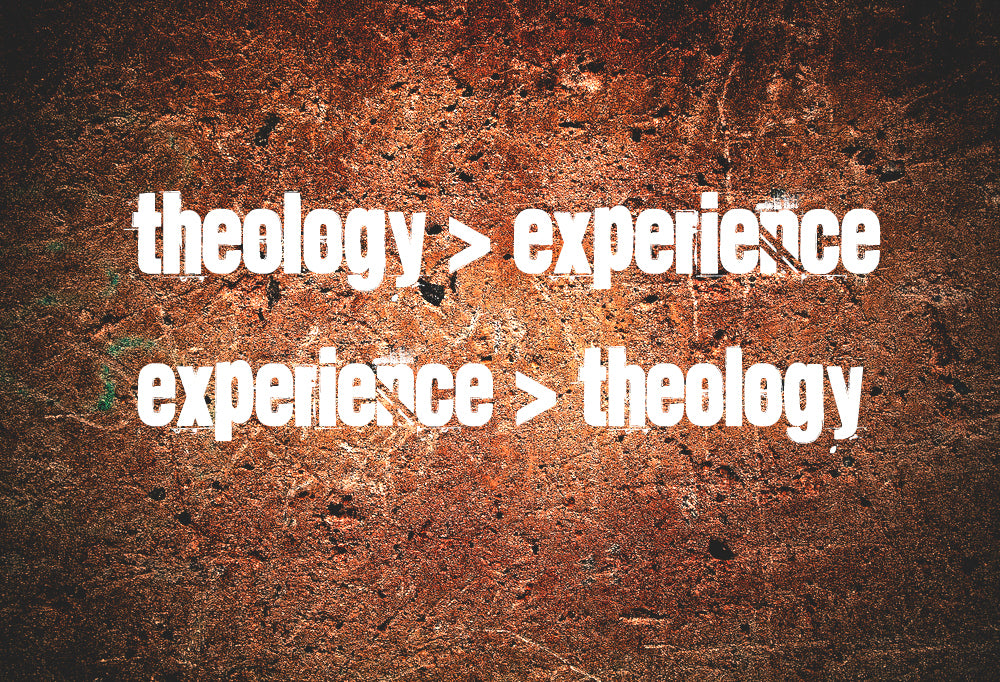
do students' experiences shape their theology? or vice versa?
As I observe teenagers, I've learned that they tend to be very visceral and experiential. They seem to want to "taste, touch, smell, and feel" life. I imagine this is your observation, as well. Research shows us that between the ages of 11-25, people need "life experiences" for proper brain development to occur. They need to create the ability to evaluate, associate, and build upon their emotions and feelings so they can put description to what they go through.
You've no doubt had those conversations with teenagers (and adults) where you hear them say "I don't feel God in my life right now." (Any of you ever feel stuck at what to say next other than the textbook response of "well, you know He's there"?) They are responding to what they perceive as a lack of an experience with God. We see this same cry in Scripture; the Psalms are riddled with laments, cries, groaning and painful pleas of "where are you God?"
But compounded on this, is the "I need it now" emphasis of digital networking (SMS, Twitter, YouTube, Facebook, etc) that has created a culture-wide lack of patience.
We've had students have "life changing" experiences on mission trips, serving projects and being hands on with leadership roles. We watch as a group of students at a camp/retreat bring back a ton of energy and excitement. We see, plan, and budget for catalytic events that will create a momentum for our students off the "experience" they will have. All in the name of an experiential aspect of our faith development.
However a careful line that must be walked upon is this tension of having experiences dictate our understanding of God, rather than have or understanding of God impact our experiences.
When God moves, it confirms who He is and what His Kingdom is about. We desire that for our students, because we want them to experience the gospel first hand & live it out. We want their lives to be impacted by God in very tangible ways. We want spiritual markers for them to look back upon, like Old Testament alters of remembrance of God moving, so to speak. We want their faith to be confirmed by living out their faith. We want 1 John 2:6 in their lives. But if their relationship with Christ is primarily based off experiences what happens when their experience is negative? What happens when the camp/retreat goes poorly, or the mission trip creates a tension in them they've never had before? What happens when their experience with a person of another faith challenges their own faith convictions?
I believe we are dealing with a biblically illiterate generation. I tend to see teenagers whose faith is based on what they feel over what they have searched to be true. When it comes to faith, it seems many students stop thinking for themselves, or stop wrestling with life tensions. Statements similar to, "if it doesn't feel comfortable or right then it must not be" fill conversations. Hard questions on pain in the world, life-hurts, sin, and doubt all stem from experiences that put tension on students' faith.
There has to be more of a foundation.
We have the Scriptures as a key revelation to the character of God. Students need to know His character so that they need can experience His character. I believe deeply, a strong conviction as a follower of Jesus, that if we aren't exposing students to knowing the character of God without experiencing God, we are doing them no good. And if we aren't allowing them to experience the person of Jesus Christ without knowing Him, again, we do them no good.
I don't have a way to balance this other than to keep it on our radar on our team, to be sure that our conversations, teachings, and focus is balanced. My prayer as a pastor is that I lead students to know God, so that when they experience Him, there is a foundation of relationship to build on.
What are your thoughts on this dynamic?




Leave a comment